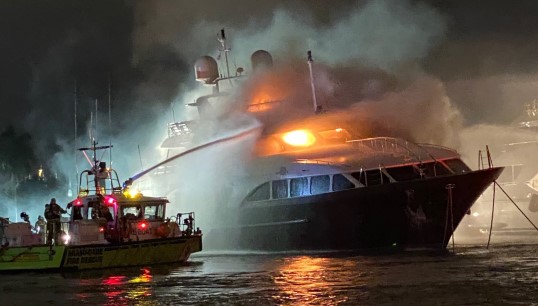- Topics
- Campaigning
- Careers
- Colleges
- Community
- Education and training
- Environment
- Equality
- Federation
- General secretary message
- Government
- Health and safety
- History
- Industrial
- International
- Law
- Members at work
- Nautilus news
- Nautilus partnerships
- Netherlands
- Open days
- Opinion
- Organising
- Podcasts from Nautilus
- Sponsored content
- Switzerland
- Technology
- Ukraine
- United Kingdom
- Welfare

Superyacht crews have been warned against the use of candles onboard their vessels, following the investigation into a fire which destroyed a US$6.3m yacht in a Florida marina in December 2019.
The Marshall Islands-flagged Andiamo was declared a constructive total loss after a blaze caused by two candles in a passenger cabin rapidly ripped through the Azimut Benetti vessel.
A stewardess had lit the candles while making final preparations for the arrival of a guest onboard the 299gt yacht and noticing that the lights throughout the lower deck and in the main salon on the main deck above were not working.
The chief engineer was taking shore leave at the time, and while the captain was phoning an ‘engineer friend’ to get advice about the computer-controlled lighting system, crew members discovered a 4ft plume of black smoke rising from the deck of the main salon.
Unable to determine the source of the smoke, the captain ordered the evacuation of the vessel. Crew members’ attempts to fight the fire were abandoned after what they described as a ‘flame ball’ coming from the main salon doors.
Local firefighters and crews from other yachts in the marina spent two hours bringing the blaze under control, but the water they used caused Andiamo to capsize at the berth.
Candle usage on a vessel, whether attended or not, also poses a fire risk. Given the dynamic environment of a vessel, candles can move, and their open flames can ignite combustible materials. The abundance of flammable materials on board can allow a fire to quickly spread out of control. Flashlights and battery-powered lighting are safer alternatives to use during a loss of electrical power.
An investigation by the US National Transportation Safety Board (NTSB) discovered that the American Bureau of Shipping (ABS) had suspended Andiamo's class six months previously because of an overdue survey. During drydock work to bring the vessel back into compliance, surveyors noted several deficiencies – including an inoperable fire detection and alarm system.
Pointing out that there was no evidence the captain and crew had sought to address the defective system, the NTSB said their 'failure to complete timely repairs to a fire-detection and alarm system known to be inoperable for two months' had contributed to the severity of the fire.
'If fully functional, the fire detection and alarm system would have alerted the crew of the fire's location at its onset and thus provided an opportunity for a direct response,' the report adds. 'Earlier detection of the fire likely would have allowed the crew to suppress the fire with onboard equipment such as handheld fire extinguishers.'
The NTSB said the candles had not been secured on candle holders or any other type of secondary containment to ensure they would remain stationary – 'a precaution particularly important on a vessel likely to sway even within its berth'. The fire's rapid spread was probably the result of interior spaces being framed in wood with veneer, it added.
'Candle usage on a vessel, whether attended or not, also poses a fire risk. Given the dynamic environment of a vessel, candles can move, and their open flames can ignite combustible materials, ' the report states. 'The abundance of flammable materials on board can allow a fire to quickly spread out of control. Flashlights and battery-powered lighting are safer alternatives to use during a loss of electrical power.'
The NTSB also noted that the Marshall Islands had issued a safety advisory last year warning about fire risks on yachts.
Tags
